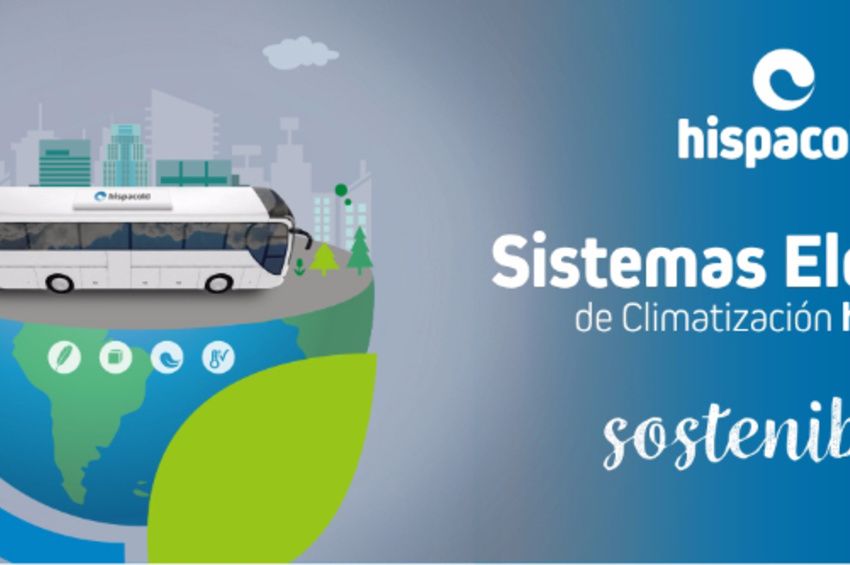The company from Seville continues to prove its commitment to an efficient quality urban transportation with a low environmental impact, which contributes to making cities sustainable and livable, with lower levels of noise and air pollution so that people can enjoy an adequate quality of life.
 23/06/2017
23/06/2017
Hispacold continues to support HVAC systems for electric vehicles, developing new versions based on market demands, and expanding the models available for new ones such as trolleybuses, integrated systems and articulated vehicles.
When adapting their products to its customers' needs and technical specifications, Hispacold has been able to develop a range of HVAC systems for very diverse –hot, cold and extreme– climate conditions, as well as adapted to different types and lengths of vehicles (up to 24 meters).
The first electric equipment developed in 2011, 9EC model, were installed on hybrid vehicles of Metz (France) and Luxembourg. Moreover, trolleybuses from the Italian city of Parma and bi-articulated hybrid buses of Barcelona were equipped with 10EC systems too.
This range was subsequently expanded with the 11NAH model, an HVAC system designed for 100% electric vehicles, with a cooling capacity of 28 kW. The first vehicles to have installed this equipment, by the end of 2014, were six units of trolleybuses in Castellón.
In addition to the aforementioned models is 12EN, an HVAC system for the driver and passengers, designed to be installed in 12-meter vehicles. This electric equipment is double-circuit with a heat pump and variable capacity control system, which allows for a much more efficient climate control in electric vehicles in which energy consumption is a major factor. The cities of San Sebastián and Barcelona were the first in witnessing electric vehicles equipped with the Hispacold HVAC system. The 12EN model with a 32 kW-capacity heat pump can already be seen in 100% electric 12-meter vehicles in Madrid, Bilbao and Marsella.
Bayona-Biarritz is expected to have 18 systems for articulated vehicles by 2018. The system will consist of two HVAC modules: 28 kW 12EN for the front car and 21 kW 9EN for the back car. The system will be complemented with a 12 kW hot-cold battery HVAC system, which causes the 100% electric vehicle batteries to always work with optimum efficiency. The mass production of this equipment will begin in early 2018.
A new version of this model, called 12TTE, operates since 2015 in urban vehicles in London. This equipment offers hot/cold temperature control for the driver and heating for the passenger compartment.
The range is completed with the 9NAH model developed for hybrid vehicles. Its refrigeration benefits are 20 kW power and the most important points at a constructive level are the great volume of air renewal, which translates into an excellent ventilation and reduction of odors inside the vehicle, as well as the installation of the air extraction system, which saves the vehicle designer works on the roof and space to place the extraction devices. The 9NAH can be used in isolation or in several units for articulated and bi-articulated vehicles.
Participation at the EBSF-2
Aiming to keep improving its HVAC systems for electric vehicles, Hispacold is participating at the European project EBSF-2 (European Bus System of the Future 2), which will allow them to have at their disposal a trial platform with real working-in-service conditions.
EBSF-2 is an innovative project financed by the European Commission within the Horizon 2020 program, which is intended to improve the efficiency and attraction of public bus transportation, designing a new generation of buses that meets the needs of the future.

Proyecto: DIGIZITY - 0: INVESTIGACIÓN INDUSTRIAL DE SOLUCIONES INNOVADORAS PARA DESCARBONIZAR, DIGITALIZAR Y AUTOMATIZAR EL TRANSPORTE URBANO CON AUTOBUSES 0 EMISIONES
Acrónimo: DIGIZITY
Líder: AVANZA ZARAGOZA SAU
Socios participantes: AVANZA SPAIN, S.L., IDNEO TECHNOLOGIES, S.A., INTERNACIONAL HISPACOLD, S.A., IRIZAR, S.COOP., JEMA ENERGY, S.A. y TELNET REDES INTELIGENTES, S.A.
Organismos de Investigación: ITAINNOVA - Instituto Tecnológico de Aragón, Fundación TECNALIA Research & Innovation y CTAG - Centro Tecnolóxico de Automoción de Galicia.
Presupuesto total del proyecto: 9.094.670, 00€
Subvención otorgada: 5.440.703,35 €
Duración del proyecto: 01/11/2021 - 31/12/2023
Proyecto financiado por la Unión Europea - NextGenerationEU a través de la convocatoria para el año 2021 Programa Tecnológico de Automoción Sostenible, en el marco del Plan de Recuperación, Transformación y Resiliencia y del Programa Estatal para Catalizar la Innovación y el Liderazgo Empresarial del Plan Estatal de Investigación Científica, Técnica y de Innovación 2021-2023 promovido por el Centro para el Desarrollo Tecnológico e Industrial (CDTI)

Financiado por la Unión Europea - Next Generation EU
INTERNACIONAL HISPACOLD S.A ha participado en el proyecto tractor PERTE VEC CAPITAL (2022-2025), liderado por IRIZAR, bajo el marco del PERTE del Vehículo Eléctrico (PERTE VEC) publicado en el año 2021. Este proyecto ha sido financiado por el Ministerio de Industria, Comercio y Turismo, conforme al artículo 18 de la Ley 38/2003, de 17 de noviembre, General de Subvenciones. Además, INTERNACIONAL HISPACOLD S.A ha recibido apoyo financiero del Mecanismo de Recuperación y Resiliencia, y del Plan de Recuperación, Transformación y Resiliencia.